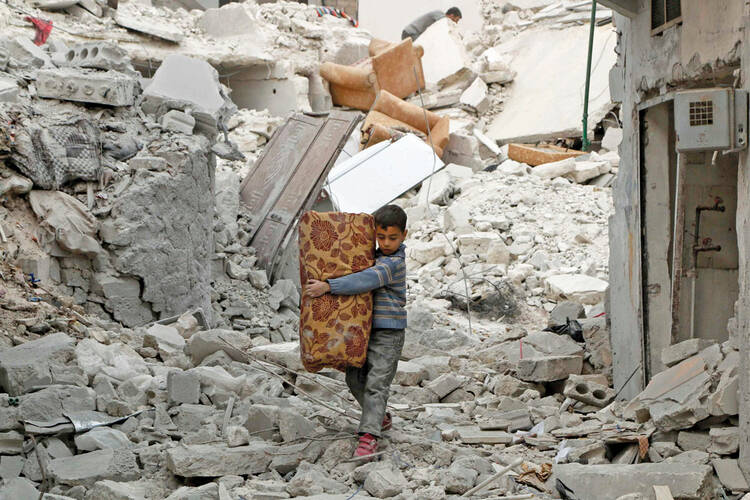The Syrian Observatory for Human Rights issued a depressing portrait on Jan. 1 of a year in death in Syria. According to the group’s tracking of the many casualties of the ongoing and complex conflict, the civil war in Syria claimed 76,021 lives in 2014. Its researchers acknowledged that this figure is likely a deep undercount of the true toll, but even the conservative figure marks 2014 as the deadliest year in Syria since the violence began in 2011.
It comes as no surprise that the fractured nation’s civilian population is enduring significant suffering. According to the observatory, 17,790 civilians, including 3,501 children and 1,987 women, died in 2014. The observatory tallied the death toll among the Pro-Assad regime Syrian military, militias and various sympathizing entities at 25,160. Rebel fighters suffered 15,488 losses, and deaths among Islamic State fighters and other Islamic militants groups totaled 16,979.
“Worth noting,” the group said, is that its tally does not include “thousands of detainees inside regime prisons and thousands of those who disappeared during regime raids and massacres,” nor does it include, among others, “hundreds of regular soldiers and pro-regime militants and supporters captured by [Islamic State] fighters, Al-Nusra front, rebel and Islamic battalions on charge of ‘dealing with the regime.’“
The human rights group deplored the “silence of the international community for the war crimes and crimes against humanity committed in Syria.” That silence, it argues, “encourages the criminals to kill more and more Syrian people.” The observatory’s researchers add that 1.5 million people have been wounded in the conflict, many of them suffering permanent disabilities. Hundreds of thousands of children have been orphaned by the civil war, the group says, noting that more than half of Syria’s people have been internally displaced or become refugees and that the nation’s infrastructure and public and private properties continue to be obliterated by the conflict.
The group calls upon “all sides to support the Syrian people in their aspirations toward freedom, equality and democracy and to exert all effort in guaranteeing that the perpetrators and their wrong-doings will not go unpunished.
Russian and Chinese Security Council vetoes have prevented charges of crimes against humanity from being referred to the International Criminal Court, the observatory called for the establishment of a special international court to investigate war crime allegations in Syria. “We in the Syrian Observatory demand the punishment of all perpetrators, instigators, collaborators and all individuals and sides who used the Syrian blood as a political card and as means to carry out their personal agendas, as well as those who transformed a revolution for dignity [into] a sectarian and ethnic civil war.”
Syria’s suffering figured prominently in Pope Francis’s “Urbi et Orbi” Christmas message. He implored God on Christmas Day to aid the victims of a “brutal persecution” in Iraq and Syria. “I ask him, the Savior of the world, to look upon our brothers and sisters in Iraq and Syria, who for too long now have suffered the effects of ongoing conflict, and who, together with those belonging to other ethnic and religious groups, are suffering a brutal persecution,” the pope said.
“May Christmas bring them hope, as indeed also to the many displaced persons, exiles and refugees, children, adults and elderly, from this region and from the whole world,” Pope Francis said. “May indifference be changed into closeness and rejection into hospitality, so that all who now are suffering may receive the necessary humanitarian help to overcome the rigors of winter, return to their countries and live with dignity.”








